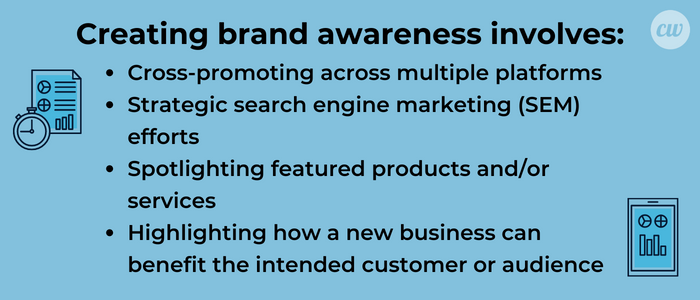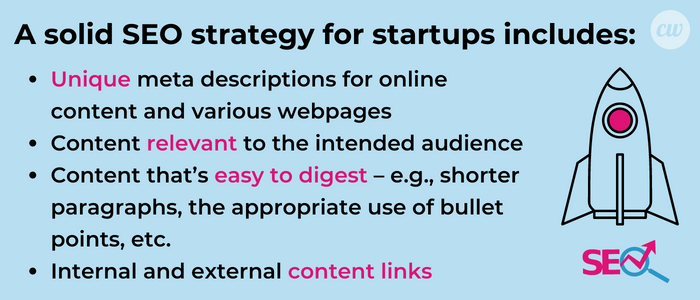
Winning at Content Marketing for Startups
There are many steps involved in creating and launching a startup, from figuring out the right business model and securing initial funding to determining a suitable pricing structure.
In general, marketing is going to be essential for any new business or enterprise launch, and content plays a big part in the process.
Once you dive into the specifics of content marketing for startups, a lot of questions tend to come to mind. What kind of content should be created? Where and how should it be used? What should be done with social media content and engagement? The decisions to be made can be a bit overwhelming when combined with an already packed to-do list.
Fortunately, content marketing for startups can be less stressful and more productive with some planning and preparation. Read on to learn more about how to put together a winning content marketing strategy for your startup.
Why Is Content Marketing for Startups Important?

A content marketing strategy for startups is what helps build brand awareness and recognition, a top goal for any new business or enterprise. After all, online searchers and potential customers have to know about a new startup to be interested in what’s offered.
The good news is with the right mix of content and search engine optimization (SEO), a newly launched business is often able to reach the target audience more effectively. This is what ultimately determines whether or not a startup gets off the ground or falls short.
According to data from 2021, only 80 percent of startups were still in business after a year. This number may not seem too high, but a 20 percent failure rate within a year is still considerable.
One of the reasons often given for startup failures is insufficient marketing. To be fair, many startups have a limited budget. However, a solid content marketing strategy makes it easier for startups with budget concerns to cost-effectively achieve key marketing and engagement goals, especially with online marketing. A solid marketing strategy does not always require a massive budget.
In fact, a well-prepared content marketing strategy helps startups achieve goals important for any new business, including:
- Attracting traffic to a newly launched website
- Generating productive leads
- Carving a unique niche within the target market
- Standing out among existing competitors
Why Invest in Content Marketing for Startups?
Even when there’s a really good idea behind a startup, it’s not going to resonate with the intended audience without content marketing and a solid strategy. However, every key aspect of content marketing has the potential to be a smart investment for new enterprises. However, there has to be a sensible “rhyme and reason” behind the overall strategy.
Need more proof content marketing can be a good investment for startups? The following businesses owe a great deal of their success to an effective content marketing strategy:
- HubSpot: A smart content strategy helped HubSpot go from a new enterprise in 2006 to one that soon generated 75 percent of its leads through content.
- Blue Apron: The recipe and ingredient delivery service attributes its tremendous growth (500 percent in 2015 alone) largely to content marketing.
- Glossier: A beauty brand that started out as a blog. Since its initial launch, Glossier has turned into a billion-dollar beauty brand and has one of the largest beauty blogs online. Emily Weiss, the creator of the blog, credits the success of her endeavor to market research and a solid understanding of the target audience.
What’s a Good Content Marketing Strategy for Startups?
The answer to this particular question is largely based on the established goals for a new startup. If this part of a content marketing strategy is missing, the result is often a haphazard approach to audience engagement that doesn’t do anyone any favors – including the intended audience.
Let’s use creating brand awareness as an example. In this case, a good marketing strategy introduces the target audience to a new business. Sure, this may seem simple enough, but there are several steps involved in this process alone. The main ones include:
- Cross-promotion across multiple platforms
- Strategic search engine marketing (SEM) efforts
- Spotlighting featured products and/or services
- Highlighting how a new business can benefit the intended customer or audience
Also with a content marketing strategy for startups, it’s often easier to focus on a few top goals first. If there are too many irons in the fire, a limited marketing budget can get quickly stretched too thin.
Besides, once results are seen with initial efforts, results that follow – such as an uptick in website traffic – make it much easier to invest in other aspects of content marketing on a larger scale. Being more measured and focused on content marketing also eases the stress that often goes along with launching a startup.

Where Do I Start with Content Marketing?
For a start-up or an existing business, setting goals and putting together an initial strategy is the first task with any new content marketing plan. Taking the following steps is associated with the process of setting goals:
- Clearly define the target audience.
- Setting reasonable and realistic objectives.
- Identify places where content should be presented to achieve those objectives.
- Establishing both short-term and long-term goals.
Today, content marketing for startups – or any business for that matter – is largely done online or digitally in some way. Still, it’s worth noting traditional content marketing methods – e.g., direct mailers, radio and TV ad content, etc. – should probably be part of the mix if it’s appropriate for a startup’s overall goals and objectives.
How Do You Create a Content Marketing Plan?
After goals have been established, the next step is to create a more detailed and business-specific content marketing plan. This is when each specific piece of the content marketing strategy is analyzed, assessed, and explored in a more detailed way.
With social media, for example, this means figuring out what platforms to use and determining things like the frequency of posts. With email marketing, email segmentation is done so content that’s more likely to be opened and appreciated can be delivered to inboxes.
A well-rounded content marketing plan for startups also involves:
- Determining whether or not paid ad content is worth investing in right away
- Diving into the many possibilities with organic SEO to keep costs in check
- Fine-tuning website content since this will be the hub for most online traffic
- Using analytics tools so results can be tracked
- Determining how local SEO fits into the business model since many online searches are local
Another important step for startups creating a content marketing plan is to create content with a cohesive message for the intended audience. Scattered content that doesn’t have a clear focus, message, or purpose isn’t going to reflect well on a new business looking to make a good first impression.
Also, for steering content towards the target audience, SEO is an incredibly useful asset for content marketing for startups. This part of the process of creating a content marketing plan starts with selecting appropriate keywords based on search intent and other essential factors. A solid SEO strategy for startups also includes:
- Unique meta descriptions for online content and various webpages
- Content relevant to the intended audience
- Content that’s easy to digest – e.g., shorter paragraphs, the appropriate use of bullet points, etc.
- Internal and external content links

What Kind of Content Is Best for Startups?
“Yes, content is king, but excellence is queen.” – Onyi Anyado, business coach, author, entrepreneur, and award-winning speaker.
The best kind of content for any startup or business is quality content. As for what specific type of content tends to be “best” for a new enterprise, there’s no one-size-fits-all answer that applies to every startup. This being said, a good starting point for many new enterprises is a blog, which can be either entirely separate or incorporated directly into a website.
Well-prepared and properly optimized blog content allows more room to fully introduce a new business, explain the operating model or concept, answer commonly asked questions by the target audience, and highlight industry or niche expertise and knowledge.
What’s termed “bottom-of-the-funnel content” can be just as beneficial for startups. This is also a type of content that addresses questions searchers are likely to ask related to something a new business is offering.
Bottom-of-the-funnel content also helps out the sales team by getting beyond the initial discovery and information gathering phase. This, in turn, increases the ability to convert leads, which is certainly good for a new startup.
For startups targeting other businesses, more detailed content can be an effective way to generate interest. In this instance, the main focus is on B2B content that goes more in-depth, with possibilities including:
- Case studies: Case studies provide opportunities for startups to clearly show how featured products or services can be beneficial in practical, real-life situations.
- Gated content: This is content so-named because it requires some basic information to gain access to it – usually an email address. It’s also a good way to develop segmented email lists peppered with people already showing an interest in what’s being offered.
- Video content: People naturally respond better to video-based content, which is excellent for startups working to explain more unique services, products, or business models in a way that’s easier to digest than what’s possible with text-based content alone.

“Inject your personality. People connect with people…” – Emma Hardy, Content Marketing Manager for StreamGo.
The point of this particular piece of advice is content marketing for startups also needs to be personalized to encourage engagement. What this means for a new enterprise is content with a distinctive voice that displays some personality behind the brand.
Final Thoughts
Content marketing for startups is also beneficial because it’s a fertile testing ground for new enterprises. Results from A/B testing, for instance, provide useful info about what resonates best with the target audience. Feedback from social media and blog engagement is equally beneficial for gaining audience insights.
What’s even more appealing is most of the insights that can be gathered from A/B testing and other early online engagement can be obtained practically free of charge in many instances. Even some useful analytics tools have a good selection of free features.
It can’t be stressed enough that the most important part of a content marketing strategy for startups is well-prepared, audience-specific content. This should be an ongoing goal for any new enterprise or any business, in general, looking to remain visible online, competitive, and financially viable.
Ken is a freelance writer currently living in the Pittsburgh area of Pennsylvania. Born in California, his fondness for writing dates back to elementary school writing contests and led to positions on both high school and college newspapers. He earned a degree in Journalism and Communications from Point Park University and did work in data entry after college before transitioning to a full-time career as a freelance writer. While his areas of expertise are marketing and health-related content, Ken is a versatile writer and enjoys exploring and researching a variety of topics. When not busy knocking out articles, he likes to spend time with friends, go for walks, and discover new and exciting things about the world around him.




